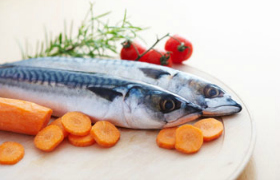Fish oil and fatty fish could negate chemotherapy effects
Consumption of fish oil and fatty fish could have negative effects on cancer treatment using chemotherapy. That is written by researchers of Antoni van Leeuwenhoek, Amsterdam, in JAMA Oncology. Led by Emile Voest, PhD, professor of medical oncology, researchers have shown earlier that the effects of chemotherapy in mice with cancer were abolished by certain fatty acids present in fish oil. New research now demonstrates that these compounds are detectable in the blood of healthy volunteers after consumption of fish oil supplements or fatty fish.
Fish oil preparations contain various fatty acids that are associated with positive health effects, such as protection of the heart and the blood vessels. Also, it has been postulated that fish oil consumption could prevent or cure cancer. However, in 2011, by the research group of Voest, at that time affiliated to the University Medical Center Utrecht, it was discovered that the fish oil-derived fatty acid 16:4(n-3) could cause an unexpected effect. In mice, this compound was able to rescue cancer cells from chemotherapy. “Only one microliter of fish oil is able to neutralise multiple forms of chemotherapy”, says Voest, who at that time already warned cancer patients for the use of fish oil supplements.
This time, recently published research confirms these results in healthy volunteers. Laura Daenen, PhD, a member of Voest’s research group, assessed the plasma concentration of 16:4(n-3) in thirty healthy volunteers upon intake of three different fish oil preparates. After administration of the recommended daily intake, significant elevations of the fatty acid were measured in the blood. Also, in twenty healthy volunteers, the plasma concentration of the same fatty acid was measured after consumption of four different kinds of fish. Especially fatty fish, such as herring and mackerel, caused elevated plasma levels of 16:4(n-3).
The authors conclude that all tested fish oil preparates as well as fatty fish contain relevant quantities of a fatty acid measurable in the plasma of healthy volunteers. This compound proved to negate the effect of chemotherapy in an animal model. Ideally, the following step would be a clinical trial to illustrate the adverse effects of fish oil on treatment with chemotherapy. “However, that is virtually impossible from an ethical point of view”, says Voest. “It is very difficult to design a trial with cancer patients on chemotherapy who we administer a compound that could neutralise that therapy.” For the time being, the authors will have to make do with circumstantial evidence. On the other hand, they are certain enough to advise cancer patients to keep their hands off fish oil and fatty fish. Voest summarises: “I would not dare use it surrounding my active chemo treatment.”
Source: Antoni van Leeuwenhoek, JAMA Oncology.
MedZine writes about notable science twice a week.







